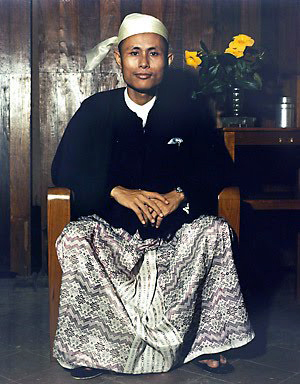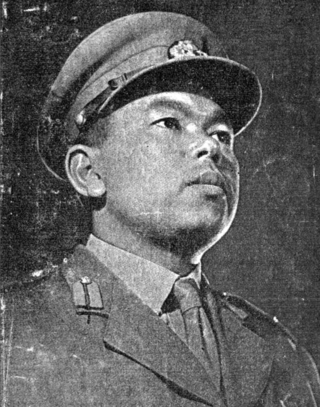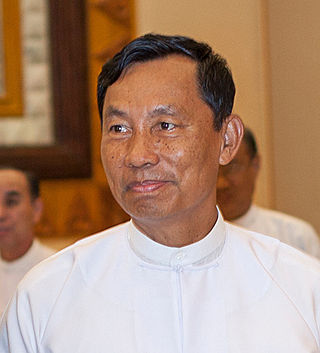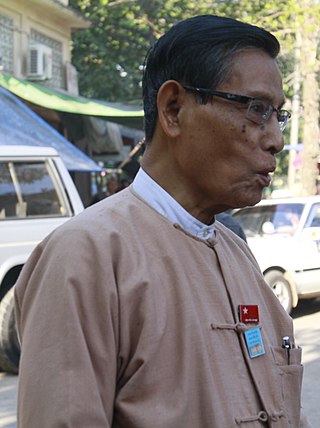Related Research Articles

The Tatmadaw or Sit-Tat is the military of Myanmar. It is administered by the Ministry of Defence and composed of the Myanmar Army, the Myanmar Navy and the Myanmar Air Force. Auxiliary services include the Myanmar Police Force, the Border Guard Forces, the Myanmar Coast Guard, and the People's Militia Units. Since independence in 1948, the Tatmadaw has faced significant ethnic insurgencies, especially in Chin, Kachin, Kayin, Kayah, and Shan states. General Ne Win took control of the country in a 1962 coup d'état, attempting to build an autarkic society called the Burmese Way to Socialism. Following the violent repression of nationwide protests in 1988, the military agreed to free elections in 1990, but ignored the resulting victory of the National League for Democracy and imprisoned its leader Aung San Suu Kyi. The 1990s also saw the escalation of the conflict involving Buddhists and Rohingya Muslims in Rakhine State due to RSO attacks on the Tatmadaw forces, which saw the Rohingya minority facing oppression and, starting in 2017, genocide.

Than Shwe is a retired Burmese army general and politician. He is known for his influential role in Myanmar. Serving as the Chairman of the State Peace and Development Council (SPDC), he held significant influence, contributing to perceptions of centralized authority. His governance, spanning from 1992 to 2011, was marked by political restrictions and a notable military presence. Than Shwe served as the head of state of Myanmar from 1992 to 2011, holding the position of Chairman of the State Peace and Development Council (SPDC).

Aung San was a Burmese politician, independence activist and revolutionary. He was instrumental in Myanmar's struggle for independence from British rule, but he was assassinated just six months before his goal was realized. Aung San is considered the founder of modern-day Myanmar and the Tatmadaw, and is commonly referred to by the titles "Father of the Nation", "Father of Independence", and "Father of the Tatmadaw".

The Burma Independence Army (BIA) was a pro-Japanese and revolutionary army that fought for the end of British rule in Burma by assisting the Japanese in their conquest of the country in 1942 during World War II. It was the first post-colonial army in Burmese history. The BIA was formed from a group known as the Thirty Comrades under the auspices of the Imperial Japanese Army after training the Burmese nationalists in 1941. The BIA's attempts at establishing a government during the invasion led to it being dissolved by the Japanese and the smaller Burma Defence Army (BDA) formed in its place. As Japan guided Burma towards nominal independence, the BDA was expanded into the Burma National Army (BNA) of the State of Burma, a puppet state under Ba Maw, in 1943.
San Yu was a Burmese army general and statesman who served as the fifth president of Myanmar from 9 November 1981 to 27 July 1988.

Kyaw Zaw was one of the founders of the Tatmadaw and a member of the Thirty Comrades who trained in Japan in the struggle for independence from Britain. He was also one of the leaders of the Communist Party of Burma, and had lived in exile in Yunnan Province, China, since 1989 after retiring from politics.

Thakin Than Tun was a Burmese politician and leader of the Communist Party of Burma (CPB) from 1945 until his assassination in 1968. He was uncle of the former State Counsellor of Myanmar Aung San Suu Kyi.

Lieutenant General Smith Dun was the commander-in-chief of the Burmese Army from 4 January 1948 to 1 February 1949.

Thura Shwe Mann is a Burmese politician who was Speaker of the Pyithu Hluttaw, the lower house of parliament from 31 January 2011 to 29 January 2016. He is a former army general and, whilst being a protégé of senior general Than Shwe, was considered the third most powerful man in the State Peace and Development Council (SPDC), which ruled Myanmar until 2011.

Tin Oo, often referred to as U Tin Oo, is a Burmese politician, activist and retired general in the Armed Forces who was one of the founders of the National League for Democracy (NLD) in Myanmar, the country's largest pro-democracy political party.

The Myanmar Army is the largest branch of the Armed Forces (Tatmadaw) of Myanmar and has the primary responsibility of conducting land-based military operations. The Myanmar Army maintains the second largest active force in Southeast Asia after the People's Army of Vietnam. It has clashed against ethnic and political insurgents since its inception in 1948.
Myint Swe is a Burmese politician and retired army general currently serving as Acting President of Myanmar as well as First Vice President. He previously served as the acting president after the resignation of President Htin Kyaw on 21 March 2018, and the chief minister of Yangon Region from 30 March 2011 to 30 March 2016. On 30 March 2016, he was sworn in as the vice president of Myanmar. A member of the military proxy Union Solidarity and Development Party, he is an ethnic Mon former lieutenant general in the Myanmar Army.

General Thura Kyaw Htin was the 7th Commander-in-Chief of the Armed Forces of the Union of Burma, former Deputy Prime Minister of Burma (Myanmar) and Minister of Defence.
Major General James Alexander Rowland Robertson, was a British Army officer who commanded the 17th Gurkha Division.
David Oliver Abel was a Burmese economist, retired Brigadier General in the Myanmar Army and former cabinet minister. He served variously as Minister of Commerce, Minister of Finance and Revenue, and Minister of National Planning and Economic Development. At one time, he ran all three ministries simultaneously. He was considered the country's economic czar throughout the 1990s.

The Karen conflict is an armed conflict in Kayin State, Myanmar. It is part of the wider internal conflict in Myanmar between the military government and various minority groups. Karen nationalists have been fighting for an independent state, known as Kawthoolei, since 1949. The Karen National Union (KNU) and its Karen National Liberation Army (KNLA) are the most prominent Karen rebel groups. Hundreds of thousands of civilians have been displaced by the conflict, many of whom fled to neighbouring Thailand and survive in refugee camps.
Thein Aung was the Chief Minister of Ayeyarwady Region, Myanmar from 2011 to 2016. He is a former brigadier-general in the Myanmar Army and was a member of the ruling military junta, the State Peace and Development Council. He is also a former Minister for Forestry.

The Commander-in-Chief of Defence Services is the supreme commander of the Tatmadaw, the armed forces of Myanmar. Since a state of emergency was declared following the 2021 military coup d'état, the Commander-in-Chief has been the highest authority in the country, with plenary power delegated by the president and the National Defence and Security Council (NDSC). Even in peacetime, however, the Tatmadaw is an independent branch of government under control of the Commander-in-Chief, though certain actions of the Commander-in-Chief require the approval of the NDSC.

The People's Defence Force is the armed wing of the National Unity Government (NUG) in Myanmar. The armed wing was formed by the NUG from youths and pro-democracy activists on 5 May 2021 in response to the coup d'état that occurred on 1 February 2021 that put the military junta and their armed wing the Tatmadaw in power. The military junta designated it as a terrorist organisation on 8 May 2021. In October 2021, NUG's Ministry of Defence announced that it had formed a central committee to coordinate military operations across the country.
Major General Zaw Hein is a former Burmese military officer and current commander of the Yangon Command.
References
- ↑ "New Burma Army, 1945-1949". www.rothwell.force9.co.uk. Retrieved 2022-12-22.
- ↑ Mike (2020-10-22). "Elections in History | Myanmar Election Commissions' Track Record Mixed at Best Over Past 30 Years". The Irrawaddy. Retrieved 2022-12-22.
- ↑ Than, U. Ba (1962). The Roots of the Revolution: A Brief History of the Defence Services of the Union of Burma and the Ideals for which They Stand. Director of Information.
- ↑ Myoe, Maung Aung (2009-01-22). Building the Tatmadaw: Myanmar Armed Forces Since 1948. Institute of Southeast Asian Studies. ISBN 978-981-230-848-1.
- ↑ Myay, Chan (2013-11-12). "The Forgotten General of Burma's Army". The Irrawaddy. Retrieved 2022-12-22.